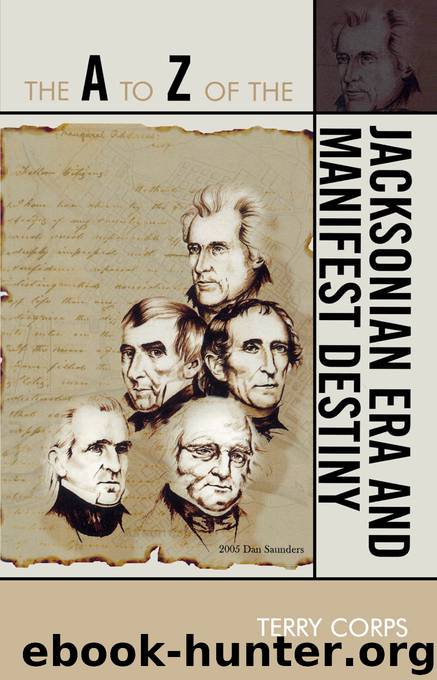The A to Z of the Jacksonian Era and Manifest Destiny by Terry Corps

Author:Terry Corps
Language: eng
Format: epub
Publisher: Scarecrow Press
Published: 2006-03-14T16:00:00+00:00
– N –
NATIONAL DEBT. This period witnessed, if only for a short time, the virtual elimination of the national debt. Andrew Jackson’s stated main fiscal priority was to pay off the debt, and through policies of administrative retrenchment and careful monitoring of internal improvements expenditure, with the aim of not allowing increases in spending to exceed the ability of the government to pay for them in any one year, he just about managed to achieve that goal. Helped by increasing revenue from land sales in particular, his administration oversaw a fairly steady fall in the national debt, to a figure of just over $37.5 million by 1835 and virtually nothing by 1836. Even after the panics of 1837 and 1839 reversed the falling trend in the debt, in 1840 it still stood at only around $4 million, one of the lowest levels in American history at 21 cents per capita.
However, the fall in the national debt did create new political problems, notably what to do with any potential or actual surplus in federal revenue. Some proposed distributing any surplus to the individual states for them to spend on such developmental projects as they chose to pursue. Indeed, when many states were hard hit by the depression of the late 1830s, finding themselves with less revenue to honor debts they had already incurred on such projects, the Whigs considered that it was politic and economically essential for the federal government effectively to assume such debts, using the distribution of surplus federal revenue as the means for doing so.
NATIONAL INTELLIGENCER. This Washington D.C. newspaper became the main organ of the National Republican and Whig parties during the Jacksonian era. Its consistency in attacking the Democratic administrations and policies of Andrew Jackson and Martin Van Buren earned its editors, Joseph Gales and William Seaton, congressional printing contracts whenever the opposition parties succeeded in controlling one house or the other. The Intelligencer continued to operate into the 1840s, when, after early optimism about the prospects of John Tyler’s administration, it watched with regret as the Whig Party tore itself apart over the banking issue and Tyler’s other vetoes. Subsequently the paper acted neither as the organ of the president, nor was particularly hostile to him, although it clearly supported the regular candidacy of Henry Clay for the election of 1844. The Intelligencer remained a thorn in the side of the Democratic administration of James Polk, criticizing most aspects of its performance but especially its foreign policy exploits.
NATIONAL REPUBLICANS. This political party developed out of that portion of the Republican Party which, under John Quincy Adams and inspired in particular by Henry Clay, began to advocate a more activist approach by government, and especially by the federal government, to fostering economic development and growth through a strong banking system, protective tariffs, and federally-funded internal improvements. The party’s organization became more established in opposition to Andrew Jackson and it often displayed greater unity in congressional roll calls on economic issues than did the evolving Jacksonian coalition, only to be thwarted by the president’s veto.
Download
This site does not store any files on its server. We only index and link to content provided by other sites. Please contact the content providers to delete copyright contents if any and email us, we'll remove relevant links or contents immediately.
| Africa | Americas |
| Arctic & Antarctica | Asia |
| Australia & Oceania | Europe |
| Middle East | Russia |
| United States | World |
| Ancient Civilizations | Military |
| Historical Study & Educational Resources |
Cat's cradle by Kurt Vonnegut(15335)
Pimp by Iceberg Slim(14488)
4 3 2 1: A Novel by Paul Auster(12375)
Underground: A Human History of the Worlds Beneath Our Feet by Will Hunt(12090)
The Radium Girls by Kate Moore(12018)
Wiseguy by Nicholas Pileggi(5770)
The Fire Next Time by James Baldwin(5431)
Perfect Rhythm by Jae(5398)
American History Stories, Volume III (Yesterday's Classics) by Pratt Mara L(5301)
Paper Towns by Green John(5179)
Pale Blue Dot by Carl Sagan(4996)
A Higher Loyalty: Truth, Lies, and Leadership by James Comey(4954)
The Mayflower and the Pilgrims' New World by Nathaniel Philbrick(4495)
The Doomsday Machine by Daniel Ellsberg(4484)
Killers of the Flower Moon: The Osage Murders and the Birth of the FBI by David Grann(4435)
The Sympathizer by Viet Thanh Nguyen(4385)
Too Much and Not the Mood by Durga Chew-Bose(4338)
The Borden Murders by Sarah Miller(4313)
Sticky Fingers by Joe Hagan(4188)
